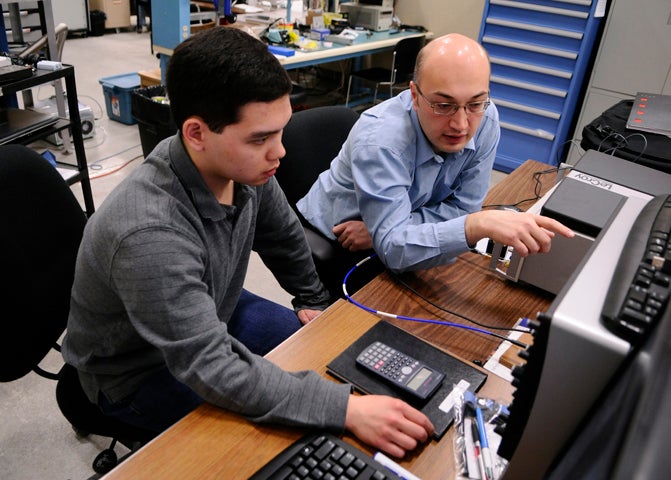A research team based at Delft University of Technology in The Netherlands, in collaboration with IQC faculty member Adrian Lupascu, has achieved a significant step forward in quantum computing using superconducting qubits.

Prior to joining the Institute for Quantum Computing (IQC) in 2009, Lupascu was based at Delft, where he and his colleagues devised means for controlling and measuring a single qubit. Effective methods to control a system of two qubits is an important step, since the future of quantum computing will require “scaling up” of technologies that can harness many quantum bits.
The qubits in their experiment can be thought of as the spins of artificial nuclei inside an artificial molecule. In this system, like many other superconducting-based systems, frequency-selective addressability of the qubits is impossible due to some of the transition frequencies coinciding.
This work demonstrates that by appropriately manipulating the amplitude and phase of the controlling microwave pulses, selectivity can be recovered.
“This method allows us to control qubits with high fidelity using a minimum of hardware,” Lupascu explained. “It’s a very promising result, as we work toward manipulating many qubits for quantum computation.”
The Delft co-authors of the paper include P.C. de Groot, J. Lisenfeld, R.N. Schouten, S. Ashhab, C.J.P.M. Harmans and J.E. Mooij.
Read the paper, titled “Selective darkening of degenerate transitions demonstrated with two superconducting quantum bits,” at Nature Physics online.
Founded in 2002, the mission of the Institute for Quantum Computing (IQC) is to aggressively explore and advance the application of quantum mechanical systems to a vast array of relevant information processing techniques.
A part of the University of Waterloo, Waterloo, Ont., Canada, IQC creates a truly unique environment fostering cutting-edge research and collaboration between researchers in the areas of computer, engineering, mathematical and physical sciences.
At the time of this release, IQC has 17 faculty members, 22 postdoctoral fellows and over 55 students and research assistants, as well as a support staff of 18.
The Institute for Quantum Computing acknowledges the support of the Government of Canada through Industry Canada and the Government of Ontario through the Ministry of Research and Innovation.